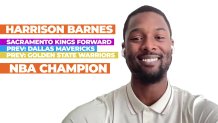Despite calls to “stick to sports” and “shut up and dribble,” pro athletes are prioritizing social justice issues in ways America hasn’t seen in decades.
Except, unlike the generations of sports stars that preceded them, today’s athletes are getting unprecedented support from their teams, leagues, and governing bodies that’s helping to magnify their messages and coordinate strategies.
“The future of athlete activism is more collaboration within sports and within other sports…the NBA Foundation was started to help assist with things like that,” said Sacramento Kings forward Harrison Barnes, a finalist for the NBA’s inaugural Kareem Abdul-Jabbar Social Justice Champion award and one of two players named to the NBA Foundation’s inaugural board of directors.
“It really comes down to how we can affect change...so it's not just a one-off PR [opportunity where we] take a picture and keep moving,” Barnes said of his behind-the-scenes conversations about social justice. “It's how can [we] actually provide support [and] build infrastructure for these organizations so they then continue to do the work they've been doing, just on a larger scale.”
Barnes said he expects the public statements and actions that America saw from pro teams and leagues in 2020 to become more common.
This week, Major League Baseball will play it’s All-Star Game in Denver, Colo., instead of its originally-scheduled all-star location near Atlanta, after Georgia lawmakers passed a controversial new elections law. Other leagues have recently made headlines for social justice initiatives as well, including the National Hockey League, which committed $5 million over the next 18 months to diversity and inclusion efforts.
NBCLX is broadcasting an All-Star political special Monday night from Denver at 7pm ET - find out how you can watch here.
“I'm hoping that this is a movement for us, not a moment,” said Kimberly Davis, Executive Vice President of Social Impact, Growth Initiatives & Legislative Affairs for the NHL. “When George Floyd was murdered, we had over 126 white players step up and use their social platforms to say that this was a human rights issue. Many of those players were from outside of the United States and didn't really understand the issue at play, but they understood human rights.
“We've used that as a springboard to continue to educate our players (and) to begin to build stronger buy-in with our general managers and our coaches in the locker room.”

The leagues are also getting help and training from the nonprofit Ross Initiative in Sports for Equality (RISE). The organization facilitates education and training for athletes and executives at all levels of sport.
“In 2020, we saw from the athlete much of what we saw from athletes in the 60s (and) 70s,” said Diahann Billings-Burford, CEO of RISE. “But one of the things that was really new was that we saw this greater commitment by leagues, by teams.
“In our last election, over 40 stadiums and arenas were used as voting sites. We saw almost 300,000 Americans vote in the election at athletic fields and athletic stadiums and athletic arenas. And that required buy-in from teams (and) leagues...we're really seeing a level of investment by some of these senior leaders that maybe has been different than the past.”
Both Billings-Burford and Barnes said the phrase, “stick to sports” shows a lack of understanding of today’s athlete.
“When I hear ‘stick to sports,’...it presupposes that the only thing that that person is is a basketball player. That is not true for any individual,” Billings-Burford said. “I think it shows that someone might be lacking history; they might be short-sighted. And I think even more, it means people are frustrated. This is a difficult topic [but] it's necessary and we can't give in to frustration.”
"We're all human beings," Barnes said. “Everyone has their own personal life - things that their community goes through, their family goes through - that they bring with them onto the court. So, yes, (athletes) may wear your favorite team's jersey and they may play for your favorite team, but that person has a life outside of the game as well.”
Sports’ top social justice advocates have also had to deal with the slow pace of progress.
"You see voter suppression. You're like, ‘man, I just want to change this right now,'" Barnes said. “You see mass incarceration [or] the way people are being policed in black and brown communities, and you want to change that right now. But change is slow and I think the biggest thing I've learned is, these things don't happen overnight.”
Noah Pransky is NBCLX’s National Political Editor. He covers Washington and state politics for NBCLX, and his investigative work has been honored with national Murrow, Polk, duPont, and Cronkite awards. You can contact him confidentially at noah.pransky@nbcuni.com or on Facebook, Instagram, or Twitter.

